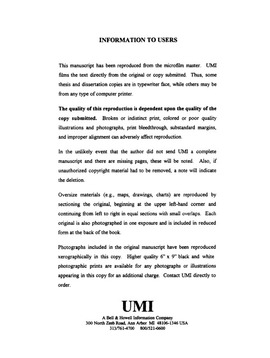| dc.contributor.advisor | O'hair, H. Dan, | en_US |
| dc.contributor.author | Boam, Thomas Lee. | en_US |
| dc.date.accessioned | 2013-08-16T12:30:42Z | |
| dc.date.available | 2013-08-16T12:30:42Z | |
| dc.date.issued | 1999 | en_US |
| dc.identifier.uri | https://hdl.handle.net/11244/5850 | |
| dc.description.abstract | For analysis of the data, individual predisposition measures were the scores from the ARG, VA and CA questionnaire, and the behavior scores were tabulated from the coded group activity for each person. The "acceptance" criterion variable was measured by calculating the absolute difference between individual scores and the group score on the proposal rankings (Delta-Rank). "Support" was measured by the score on the individual exit questionnaire (IEQ). Using ANCOVA, a comparison was made of the resulting 12 relationships (three traits and three behaviors, compared with two outcome measures). The model also included demographic data from each of the participants to determine if age, gender, residence outside of the US, or length of employment had any impact on the results. | en_US |
| dc.description.abstract | The participants were asked to complete survey instruments to measure ARG, VA, and CA predispositions. They were then assigned to work in a group of five people. The group members interacted in a decision making exercise where they discussed five projects, reached consensus on the importance of each one, and reported their rankings of the proposals. Group deliberations were videotaped, Coders viewed the tapes, and recorded the behaviors of the group members that correspond to the ARG, VA, and CA predispositions. Group members then completed an exit questionnaire, expressing their level of support for the group decision. They then individually ranked the five proposals again, based on their personal decision preference, not that of the group. Finally, the group members evaluated their behavior within the test group, comparing themselves to their behavior in real group situations. This measure was used to examine the effect that observing and recording the groups' activities had on individual behaviors and attitudes. | en_US |
| dc.description.abstract | For this study, the traits of Argumentativeness (ARG), Verbal Aggressiveness (VA), Communication Apprehension (CA) and their associated behaviors (predictor variables) have been selected to investigate their relationships to the group decision process. This study argues that because the correctness of a group decision is difficult to ascertain in open-ended questions, the quality of the task-related group outcome may be most appropriately measured through indicators which must be present for group decision making activity to succeed. These indicators are individual acceptance of the group decision, and individual support of the decision, as defined in the study (criterion variables). This study hypothesized that the predictor variables of trait predispositions and behaviors influence the criterion variables of acceptance and support in the group decision process. | en_US |
| dc.description.abstract | The results indicate a positive relationship between argumentative behavior and agreement with the group decision. The hypothesized relationship between trait argumentativeness and agreement with the group decision, and between VA and CA was not statistically significant. There was no statistically significant relationship between support for the group decision and any of the predictor variables. Demographic factors are also not significantly related to these variables. There was a significant negative relationship between trait ARG and argumentative behavior. This was not true with VA and CA behaviors, however, which were positively correlated with each other. This research indicated that argumentative behavior does influence the agreement with group decisions. Those who argue feel more like they have had a role in shaping the decision, and therefore agree with it. (Abstract shortened by UMI.) | en_US |
| dc.format.extent | xiv, 252 leaves : | en_US |
| dc.subject | Speech Communication. | en_US |
| dc.subject | Sociology, General. | en_US |
| dc.subject | Group decision making. | en_US |
| dc.subject | Business Administration, General. | en_US |
| dc.title | Argumentativeness, verbal aggressiveness, communication apprehension and their relationship to acceptance and support of decisions made in small groups. | en_US |
| dc.type | Thesis | en_US |
| dc.thesis.degree | Ph.D. | en_US |
| dc.thesis.degreeDiscipline | Department of Communication | en_US |
| dc.note | Major Professor: H. Dan O'hair. | en_US |
| dc.note | Source: Dissertation Abstracts International, Volume: 60-08, Section: A, page: 3000. | en_US |
| ou.identifier | (UMI)AAI9940292 | en_US |
| ou.group | College of Arts and Sciences::Department of Communication | |
